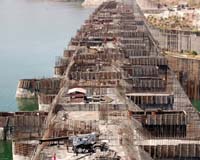| . |  |
. |
Bhopal, India (UPI) Nov 23, 2009 A report issued in connection with the 25th anniversary of the Bhopal, India, chemical disaster says the area's drinking water remains toxic. The report, released Tuesday by the Bhopal Medical Appeal, says there are still high levels of toxic chemicals in the drinking water supply of 15 communities near the old Union Carbide pesticide plant where the catastrophe occurred. The report that includes test results from June sampling says the water in and around the Union Carbide factory site in Bhopal still contains extremely unsafe levels of carbon tetrachloride and other persistent organic pollutants, solvents, nickel and other heavy metals. And officials said people in the area suffer high rates of birth defects, rapidly rising cancer rates, neurological damage, chaotic menstrual cycles and mental illness. The disaster occurred at midnight Dec. 3, 1984, when the plant accidentally released 27 tons of lethal gases, which the government said immediately killed 3,787 people. Others estimate up to 10,000 people died within 72 hours and 25,000 others have since died of gas-related diseases, Wikipedia said. Share This Article With Planet Earth
Related Links Water News - Science, Technology and Politics
 India water demand set to double by 2030: study
India water demand set to double by 2030: studyNew Delhi (AFP) Nov 24, 2009 India's water needs are set to double by 2030, which could dry up its river basins, according to new research released Tuesday that paints a grim picture for supplies across the emerging world. Global fresh water demand by 2030 will be 40 percent higher than current supplies and agriculture is predicted to suck up 65 percent of all resources, said the report by the 2030 Water Resources Group ... read more |
|
| The content herein, unless otherwise known to be public domain, are Copyright 1995-2009 - SpaceDaily. AFP and UPI Wire Stories are copyright Agence France-Presse and United Press International. ESA Portal Reports are copyright European Space Agency. All NASA sourced material is public domain. Additional copyrights may apply in whole or part to other bona fide parties. Advertising does not imply endorsement,agreement or approval of any opinions, statements or information provided by SpaceDaily on any Web page published or hosted by SpaceDaily. Privacy Statement |